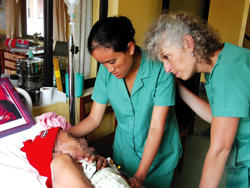|
|
| Shechen\'s nurse Furgyalmu Sherpa and a French volunteer with a 71-year-old stomach cancer patient who passed away in October. |
The walls of Hospice Nepal are a cheery yellow. It's clean, airy, and quiet, and a far cry from the chaos and sharp medical smells of most Nepali hospitals. A comforting sense of calm belies the stories of the occupants-a 21-year-old woman with an inoperable brain tumour, a 45-year-old with advanced cervical cancer, and a 51-year-old man dying of cancer of the liver.
Hospice Nepal is a leader in a new segment of Nepali healthcare, hospices and palliative care services that allow terminally ill patients to die painlessly and with dignity. Until less than a decade ago, dedicating resources to patients who couldn't be saved was an alien concept even to most medical personnel. The focus is on prevention and cure, so palliative care is low priority.
As death rates from problems like maternal mortality and TB decrease, predictions are that mortality rates from terminal illnesses like cancer, hepatitis B, and HIV/AIDS will rise. To address this shift, several new hospices have been set up in recent years.
Shechen Clinic in Boudha has been open for a year and, unlike Hospice Nepal in Lagankhel's focus on cancer patients, offers its seven beds to all types of cases.
They've had 15 patients pass away so far, but Shechen's general manager Dominique Marchal says proper care often means patients live longer and better, sometimes even going into remission and rejoining their communities.
Still, dealing with dying and death is hard on hospice staff. Since opening their nine-bed facility four years ago, Hospice Nepal has seen roughly a hundred deaths a year. "It's difficult, no matter how hard we care, we can't save patients. It's not like other medical fields, where you get to see them get better and leave," says Sanu Maiya Rana, head nurse at Hospice Nepal, which initially began as a few beds hired in HM Hospital six years ago.
Gently caring for an elderly stroke victim, Shechen nurse Furgyalmu Sherpa agrees, but adds that the work is rewarding. "Families are tired after months of caring for patients, so they get a rest too," she says.
Gyan Bhakta Shrestha, sitting by his brother Narayan, who was in Hospice Nepal with liver cancer, sang praises of the staff and talked of how they even arranged for him to go home for Dasain Tika.
Medically, the biggest contribution hospices make to their patients' lives is pain relief. Shechen's Dr Dipendra Sharma says that sometimes just Paracetamol or Ibuprofen is effective, but they can administer stronger morphine-based medication as well. Groups like Nava Kiran Plus, which cares for people with HIV, administer anti-retroviral drugs but say that paying for ARVs and getting them on time is a major challenge. However, hospices also deal with the psychological and spiritual aspects of dying as well. Rather than just medical jargon, there's a lot of talk about love and caring too.
Like the Nava Kiran Plus hospice in Budhanilkantha, Maiti Nepal's Sonja Kill Memorial Hospice also tries to provide ARVs, which means some patients become long-term residents. The ten-month-old centre is a 43-bed facility spread over seven ropanis (3.5 sq km) of land in Gokarna. Like Maiti Nepal's first hospice, started in Jhapa in 1999, it is solely for women with AIDS and their children.
Palliative care units are also part of Banepa's Scheer Memorial Hospital and the BP Koirala Memorial Cancer Hospital in Bharatpur. Organisations like Sneh Samaj and Karuna Bhawan run 'care and support' centres for AIDS patients that essentially double as hospices as well.
Funding is always a challenge. Hospice Nepal runs on donations, charging only for medication and oxygen if patients can afford it. Cancer patients have usually exhausted their resources on chemotherapy and other treatment.
Equally problematic is the lack of awareness among medical personnel and the general public. Often, hospitals simply send patients with terminal illnesses home to die. Even patients brought to hospices face trouble, as families sometimes refuse to inform them that they're dying, and gloss over the difference between a hospital and a hospice. Hospice Nepal has started holding workshops for medical staff and lay people about issues surrounding terminal illness and hospices, and is trying to expand a home-based palliative care service.
Hospice staff seem committed and inspired by their work. They talk fondly of the strong relationships that form with patients and their families, and the new perspectives they gain on life. Shechen's Dr Sharma says, "We can't cure them, but helping give a painless, peaceful death has its rewards."



